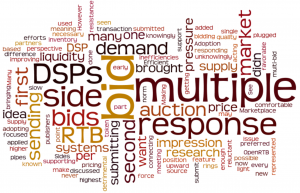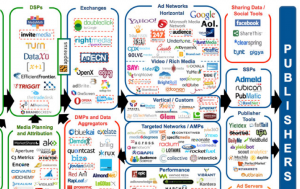Why historically (and currently) only one single bid was allowed for each DSP per impression? Why hide demand from the exchange and create opportunities for the DSPs to arbitrage? – I know this is changing now with the possibility of multiple bids per DSP (openRTB v2) but why ad exchanges let this happen at the beginning?
This question was asked on quora, below is my answer.
![One bid per impression, why?]() Short Answer
Short Answer
A multiple bid response was discussed at the very first OpenRTB meeting. It was not seen as a favorable feature by the demand side, at first. They preferred submitting one bid. Supply side partners were not in a position to force the issue, nor had the necessary research been done to support the idea.
Early Days
From the supply side’s perspective, as with many transaction systems, early efforts in RTB were focused on connecting the pipes. RTB represented a new source of demand and the pressure was applied to getting plugged in to as many DSPs as possible. Read more








